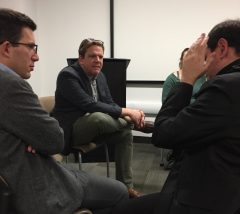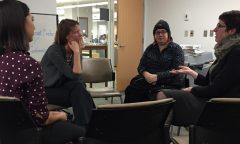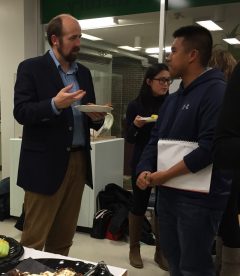Speed-Dating for Historians: Undergraduate Students Learn About Life Beyond the Academy

Shawn Anctil knew it was time for a change when, unemployed and without any obvious career aspirations, he found himself crammed uncomfortably into a Volkswagen van with a bunch of pals on a cross-Canada road trip that went horribly wrong. What followed was a twisting career path that led him to his current work as a research analyst at Colleges and Institutes Canada. Although there were some missteps along the way, Anctil maintains that the training he received as a student in History was key to his professional development.
Anctil, along with Betsey Baldwin (Public History Inc.), Andrew Burtch (Canadian War Museum), and Heather Perrault (Know History) shared their varied professional experiences with a group of History undergraduates on November 24, demonstrating the worth of a history degree in today’s competitive job market. Not only does studying history provide actual skills like how to research, write and synthesize complex materials, they explained, it also helps shape you into an informed, curious and flexible person who can put events into context, adjust to new circumstances and find creative ways forward.

The idea for the session emerged out of the mandatory course for second-year students, The Historian’s Craft. Over the course of Fall term, course instructor Beth Robertson has invited a variety of historians working in the field—individuals who work as curators, archivists, civil servants, museum professionals, administrators, and artists—in order to engage with students about they apply their training as historians in their professional lives.
This mentoring workshop was meant to deepen that connection. It offered students the opportunity to interact one-on-one with these four professionals and to ask them about their career journeys.

Although these journeys were varied, the speakers offered students practical advice about how to apply their classroom training beyond the academy. Indeed, several speakers reinforced one piece of advice: get to know your professors. Perrault, a senior associate at the historical research firm, Know History, credited the connections she forged with her professors for creating the networks that led to her current job. Similarly, Andrew Burtch, a historian at the Canadian War Museum, learned about professional qualifications that he would need to pursue work in the field of military history from his professors. Meanwhile, Betsey Baldwin showed how classroom assignments such as research papers could lead to unexpected connections with local museums or other organizations. Baldwin used the research skills she honed as a student to build a company that specializes in historical research.
The department will be hosting a similar event at the end of the winter term. These events are meant to establish the groundwork for a more durable network of mentors in the community that will connect Carleton undergraduates with historians working in the field. According to Robertson, the goal is to “facilitate more long-lasting mentorship relationships that can continue throughout the students’ degree here at Carleton.”